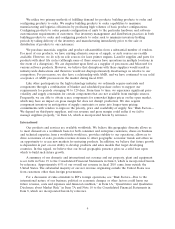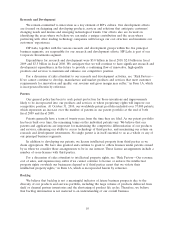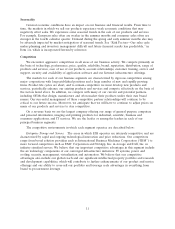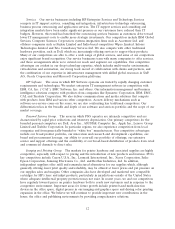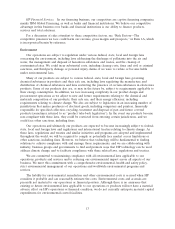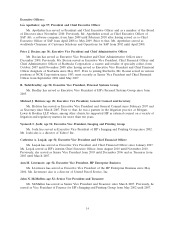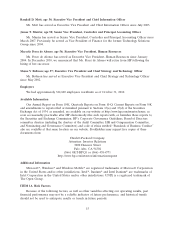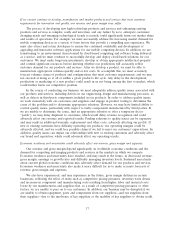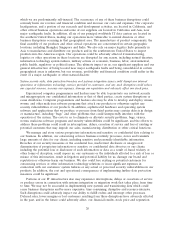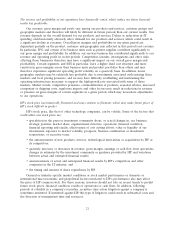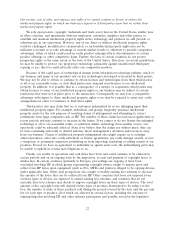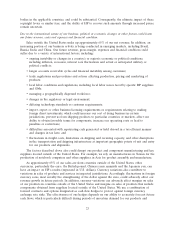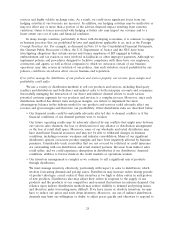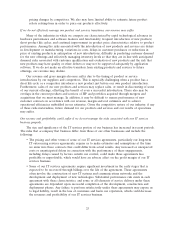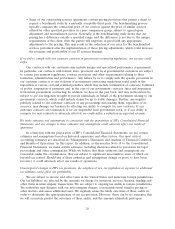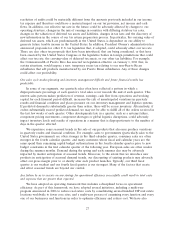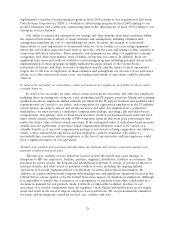HP 2010 Annual Report Download - page 26
Download and view the complete annual report
Please find page 26 of the 2010 HP annual report below. You can navigate through the pages in the report by either clicking on the pages listed below, or by using the keyword search tool below to find specific information within the annual report.Economic weakness and uncertainty could cause our expenses to vary materially from our
expectations. Any renewed financial turmoil affecting the banking system and financial markets or any
significant financial services institution failures could negatively impact our treasury operations, as the
financial condition of such parties may deteriorate rapidly and without notice in times of market
volatility and disruption. Poor financial performance of asset markets could lead to increased pension
and post-retirement benefit expenses. Other income and expense could vary materially from
expectations depending on changes in interest rates, borrowing costs, currency exchange rates, hedging
expenses and the fair value of derivative instruments. Economic downturns also may lead to
restructuring actions and associated expenses.
We depend on third-party suppliers, and our revenue and gross margin could suffer if we fail to manage
suppliers properly.
Our operations depend on our ability to anticipate our needs for components, products and
services and our suppliers’ ability to deliver sufficient quantities of quality components, products and
services at reasonable prices in time for us to meet critical schedules. Given the wide variety of systems,
products and services that we offer, the large number of our suppliers and contract manufacturers that
are dispersed across the globe, and the long lead times that are required to manufacture, assemble and
deliver certain components and products, problems could arise in planning production and managing
inventory levels that could seriously harm us. In addition, our ongoing project to improve the efficiency
of our supply chain could cause supply disruptions and be more expensive, time consuming and
resource-intensive than expected. Other supplier problems that we could face include component
shortages, excess supply, risks related to the terms of our contracts with suppliers, risks associated with
contingent workers, and risks related to our relationships with single source suppliers, as described
below.
•Shortages. Occasionally we may experience a shortage of, or a delay in receiving, certain
components as a result of strong demand, capacity constraints, supplier financial weaknesses,
inability of suppliers to borrow funds in the credit markets, disputes with suppliers (some of
whom are also customers), disruptions in the operations of component suppliers, other problems
experienced by suppliers or problems faced during the transition to new suppliers. In particular,
our PC business relies heavily upon OMs to manufacture its products and is therefore
dependent upon the continuing operations of those OMs to fulfill demand for our PC products.
HP represents a substantial portion of the business of some of these OMs, and any changes to
the nature or volume of business transacted by HP with a particular OM could adversely affect
the operations and financial condition of the OM and lead to shortages or delays in receiving
products from that OM. If shortages or delays persist, the price of these components may
increase, we may be exposed to quality issues or the components may not be available at all. We
may not be able to secure enough components at reasonable prices or of acceptable quality to
build products or provide services in a timely manner in the quantities or according to the
specifications needed. Accordingly, our revenue and gross margin could suffer as we could lose
time-sensitive sales, incur additional freight costs or be unable to pass on price increases to our
customers. If we cannot adequately address supply issues, we might have to reengineer some
products or service offerings, resulting in further costs and delays.
•Oversupply. In order to secure components for the provision of products or services, at times we
may make advance payments to suppliers or enter into non-cancelable commitments with
vendors. In addition, we may purchase components strategically in advance of demand to take
advantage of favorable pricing or to address concerns about the availability of future
components. If we fail to anticipate customer demand properly, a temporary oversupply could
result in excess or obsolete components, which could adversely affect our gross margin.
18



